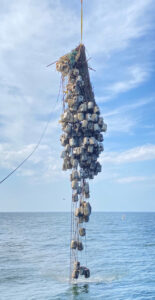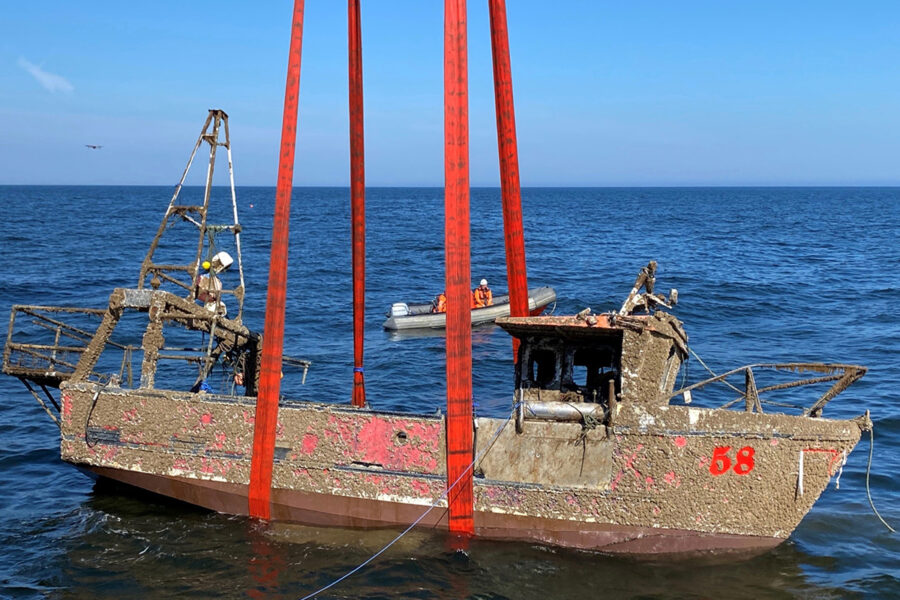The MAIB has issued its report into the capsize and sinking of the 9.8m whelk potter Nicola Faith BS 58 on 27 January, 2021, 1.9 miles north of Rhos-on-Sea in North Wales, with the loss of its three crew, reports Gaby Bartai.
The vessel left its home port of Conwy shortly after 10am on the morning of 27 January with skipper Carl McGrath and crewmen Ross Ballantine and Alan Minard onboard. The plan for the day was to relocate several strings of pots to fresh grounds, and to haul and reshoot strings previously laid in the area.
During the day, the vessel worked two to three miles offshore in the vicinity of Great Ormes Head and eastwards to Colwyn Bay. At about 2pm, Carl McGrath texted his whelk buyer, informing him that he had 20 bags of whelks onboard and that he would update him later with the total number he intended to land. At 5.59pm, when the Nicola Faith was 1.8 miles off Rhos-on-Sea, its IVMS stopped transmitting.
The Nicola Faith did not return to port that evening as expected, but it was not until 10.08am the following morning that the Coastguard received a call reporting it as overdue.
RNLI lifeboats and Coastguard helicopters were then tasked to the scene. The search continued until 6pm on 29 January, but no sign of the missing vessel was found. A wide-ranging underwater search then began.
The bodies of the three men were washed ashore in different locations over a three-day period between 12 and 14 March. All were found to have drowned.
The vessel was eventually located on 3 April. The wreck was then raised and taken ashore; once it was refloated, extensive stability tests were carried out.
The MAIB investigators concluded that the vessel must have foundered rapidly, as the crew were unable to raise the alarm. Indications are that it capsized to port, and that the crew were trapped onboard and taken down with the vessel when it sank.
The investigation found that the vessel had been significantly modified since 2017, and that these modifications had eroded its margin of stability. It concluded that the vessel probably capsized and sank due to it being loaded with catch and gear to the point of instability.
Nicola Faith had carried similar and heavier weight of catch previously without incident, says the report, but on this occasion, the skipper was also moving multiple stings of pots to fresh grounds, which ‘not only added significant additional weight to the vessel but also resulted in a cramped and dangerous workspace’.

The gear from the Nicola Faith being recovered from the vicinity of the wreck – combined with the day’s catch, this was found to have overloaded the vessel ‘to the point of instability’.
The report says: “The skipper’s decision to relocate four strings of pots at the same time (2,521kg) combined with the volume of catch (estimated as 2,090kg) meant that Nicola Faith was probably carrying over 4.6t of catch and fishing gear on deck, and its already poor margin of positive stability had almost completely disappeared.”
The report also concludes that: “Nicola Faith was habitually operated in an unsafe manner, with heavy loads of catch stowed on both the deck and the cat catcher. This resulted in the vessel having very limited freeboard and a reduced margin of positive stability.”
While the purpose of an MAIB report is not to determine liability or apportion blame, the investigators note that ‘the actions taken by the skipper to maximise Nicola Faith’s yield put the vessel at an increased risk of capsize and beyond the limits of its safe operation’.
None of the crew were wearing PFDs at the time of the accident. No PLBs were registered to the vessel, and it was not fitted with a EPIRB, as was mandatory by the time of the accident. Neither of the crewmen had completed any of the mandatory safety courses.
The vessel is known to have experienced two near capsizes in the 12 months prior to the accident. Local concerns had also been raised with the skipper about the very heavy loads with which the vessel regularly returned to port.
The report makes recommendations to the MCA to amend its code of practice for under-15m vessels to refer to a load limit rather than a catch limit, and to review its guidance to surveyors to clarify what level of modification should trigger further investigation into a vessel’s stability.
Commenting on this report and that on the loss of the Joanna C (Fishing News, 30 June, ‘Report issued into sinking of Joanna C with loss of two lives’), chief inspector of marine accidents Andrew Moll said: “There are important lessons about stability from these accidents that must be understood and acted upon by all small fishing boat operators.
“The first lesson is that modifications, unless properly planned, can significantly erode a vessel’s margin of stability… It is essential that skippers know the limitations of their vessels, and that any modifications to the vessel or changes to fishing methods are properly assessed and approved before fishing resumes.
“The second lesson is that any vessel can become unstable if overloaded. Nicola Faith had been modified, and the modification had not been approved. Nonetheless, the vessel could have been operated safely with care. On the day of the accident, the crew were relocating their pots to a new area and were carrying a full day’s catch as well. The combined weight of the catch and fishing gear piled on deck was far more than the boat was designed to carry; it capsized, and all three crew were lost in that accident.
“Fishermen will always be tempted to land a big catch, but moving fishing gear at the same time can be overwhelming.
“As fuel prices soar, the temptation to carry more and do fewer trips makes economic sense, but where stability is concerned the results can be catastrophic.
“Five families’ lives have been shattered by these two accidents, both of which were entirely avoidable. To all fishing vessel crews I have this simple message: safety begins with good stability. Know your boat’s limitations and operate within them.”
A safety flyer has been issued to the industry with advice about vessel modifications, stability and the importance of PFDs, PLBs and EPIRBs.
The full report can be read here.
This story was taken from the latest issue of Fishing News. For more up-to-date and in-depth reports on the UK and Irish commercial fishing sector, subscribe to Fishing News here or buy the latest single issue for just £3.30 here.








